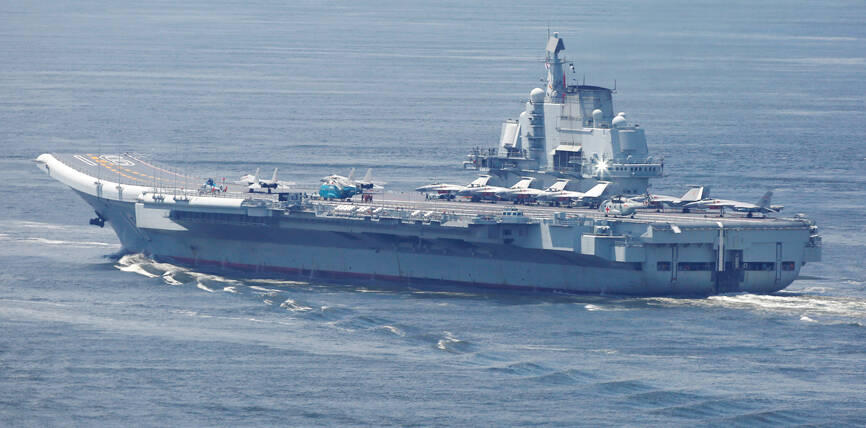China is increasingly likely to employ a strategy of anti-access/area denial (A2/AD) around Taiwan, which would use three carrier groups, a report from the Mainland Affairs Council (MAC) said.
When China’s third aircraft carrier, the Fujian, is completed next year, China would have three carriers, which would likely be used to surround Taiwan and implement an A2/AD strategy, it said, adding that efforts to strengthen China’s two other carriers — the Liaoning and the Shandong — appear to corroborate this.
In the quarterly report, the council cited declassified documents from the Ministry of National Defense that categorized China’s carriers as a threat if used for A2/AD, and said that China might coordinate its naval, air force and rocket force capabilities to operate beyond the first island chain and deter foreign forces from getting involved in a conflict involving Taiwan.

Photo: Reuters
The Chinese People’s Liberation Army (PLA) Rocket Force would deploy medium and long-range conventional ground-attack and anti-ship ballistic missiles, and cruise missiles to foreign forces in the area between the first and second island chains, it said.
Citing military researchers, the report said that in the event of an attempted invasion of Taiwan, Chinese forces would likely first take formation in the northern part of the Philippine Sea, somewhere between 300km and 800km east of Taiwan proper. This posture would allow China to face Taiwan simultaneously on two fronts, with forces east of Taiwan also acting as a deterrent to foreign forces, it said.
Separately, Institute for National Defense and Security Research fellow Su Tzu-yun (蘇紫雲) on Sunday said that China’s three carriers are part of China’s transition from a land power to a sea power.
The introduction of the Fujian into service would help make the PLA Navy a “blue water navy,” and allow China to more effectively encircle Taiwan, he said.
The range of Taiwan’s Xiangfeng missiles is 200km to 250km, so China’s carriers would be deployed 300km or more east of Taiwan, putting them out of range, he said. Meanwhile, the range of the fighter jets that would be deployed from the carriers is about 800km, so an attack on Taiwan could be launched from within a safe range.
Taiwan can use anti-ship missiles to attack approaching enemy ships, but must rely on submarines to deal with long-distance aircraft, he said, adding that domestically-built submarines are important.
In the event of a war, it would be difficult for Chinese aircraft to safely pass through the Bashi Strait or Miyako Strait, he said, adding that if the US were to help Taiwan, China’s aircraft carriers in waters east of Taiwan would be “sandwiched” between attacks from both sides.
Within the strategic triangle comprised of Hawaii, Guam and Taiwan, Chinese carriers would become the target of the US military, he said.
“Thoughts to the contrary are simply wishful thinking on the part of the Chinese,” he said.
Chinese aircraft carriers stationed east of Taiwan during an attack would also be subject to a war of attrition since they would need supplies within one to two weeks, he said.
“Since the passage of supply ships through the Bashi Channel or Miyako Strait would be too dangerous, and China has no overseas bases, supplying the carriers would be impossible,” he said. “Any advantage brought by the carriers would be quickly lost.”

Alain Robert, known as the "French Spider-Man," praised Alex Honnold as exceptionally well-prepared after the US climber completed a free solo ascent of Taipei 101 yesterday. Robert said Honnold's ascent of the 508m-tall skyscraper in just more than one-and-a-half hours without using safety ropes or equipment was a remarkable achievement. "This is my life," he said in an interview conducted in French, adding that he liked the feeling of being "on the edge of danger." The 63-year-old Frenchman climbed Taipei 101 using ropes in December 2004, taking about four hours to reach the top. On a one-to-10 scale of difficulty, Robert said Taipei 101

A preclearance service to facilitate entry for people traveling to select airports in Japan would be available from Thursday next week to Feb. 25 at Taiwan Taoyuan International Airport, Taoyuan International Airport Corp (TIAC) said on Tuesday. The service was first made available to Taiwanese travelers throughout the winter vacation of 2024 and during the Lunar New Year holiday. In addition to flights to the Japanese cities of Hakodate, Asahikawa, Akita, Sendai, Niigata, Okayama, Takamatsu, Kumamoto and Kagoshima, the service would be available to travelers to Kobe and Oita. The service can be accessed by passengers of 15 flight routes operated by

Taiwanese and US defense groups are collaborating to introduce deployable, semi-autonomous manufacturing systems for drones and components in a boost to the nation’s supply chain resilience. Taiwan’s G-Tech Optroelectronics Corp subsidiary GTOC and the US’ Aerkomm Inc on Friday announced an agreement with fellow US-based Firestorm Lab to adopt the latter’s xCell, a technology featuring 3D printers fitted in 6.1m container units. The systems enable aerial platforms and parts to be produced in high volumes from dispersed nodes capable of rapid redeployment, to minimize the risk of enemy strikes and to meet field requirements, they said. Firestorm chief technology officer Ian Muceus said

MORE FALL: An investigation into one of Xi’s key cronies, part of a broader ‘anti-corruption’ drive, indicates that he might have a deep distrust in the military, an expert said China’s latest military purge underscores systemic risks in its shift from collective leadership to sole rule under Chinese President Xi Jinping (習近平), and could disrupt its chain of command and military capabilities, a national security official said yesterday. If decisionmaking within the Chinese Communist Party has become “irrational” under one-man rule, the Taiwan Strait and the regional situation must be approached with extreme caution, given unforeseen risks, they added. The anonymous official made the remarks as China’s Central Military Commission Vice Chairman Zhang Youxia (張又俠) and Joint Staff Department Chief of Staff Liu Zhenli (劉振立) were reportedly being investigated for suspected “serious